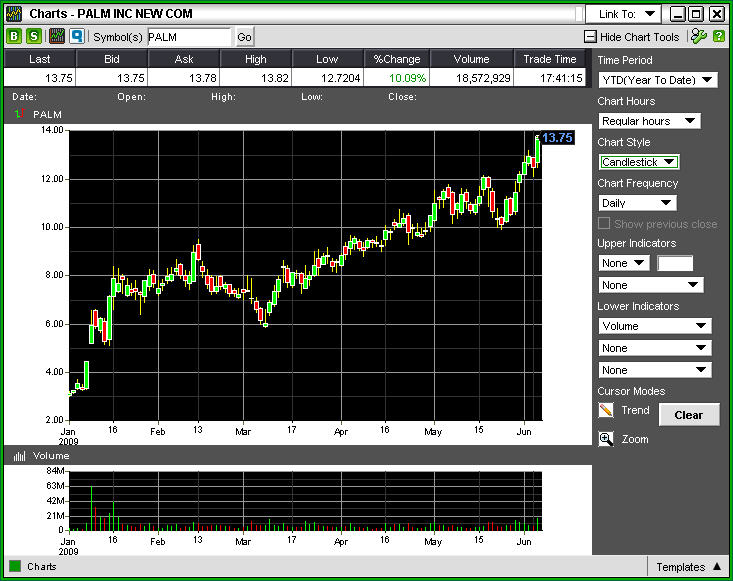Gauging the Palm Pre's success: It'll take time

Palm's long-awaited Pre device is available this weekend and the launch will be closely watched. The lines at Sprint stores will be analyzed. Analysts will guess Pre units sold in the first weekend. And the Pre will be compared to the iPhone launch repeatedly. All of those short-term mileposts will miss the big picture: Gauging the success of the Pre will be a long-term endeavor.
Oh sure, Palm sales on the first weekend will be closely watched, but shortages are expected. In fact, Pre units are likely to be hard to get. But that generates buzz. Add it up and the Palm Pre launch is likely to be modest---and possibly deemed a failure following all the strong reviews. On Monday it's likely that folks will note how:
- Palm failed to move millions of Pre units;
- Palm doesn't have what it takes to compete;
- Palm doesn't have the apps;
- Palm relies on Sprint.
- And Palm couldn't come close to Apple's iPhone launch.
All of those gripes will probably be accurate, but the real read on Pre's impact will come over the period of weeks and months. Research firm Morgan Joseph expects Palm to ship 1.9 million units in calendar 2009 and 3 million in 2010.
So how do we gauge the success of the Pre? How the following questions are answered will tell the Pre tale:
Did the Pre save Palm? You could argue that the Pre has already saved the company. Let's face it: Without the Pre's big splash at the Consumer Electronics Show in January Palm would be toast. Since that splash Palm has become relevant again. The company is worth more than it was, it now has a stock price it can use to raise capital and as long as the Pre isn't a total disaster Palm has a puncher's chance in the smartphone market.
Palm still lacks the resources to compete with Nokia, Research in Motion and Apple, but it has a shot.
Also see: Most popular Palm Pre content
Is the Pre the basis of a family of smartphones? Palm executives have indicated that the Pre is just the beginning of larger plans and Verizon Wireless backed those statements up.
Late last month, Verizon Wireless CEO Lowell McAdam strongly hinted that the carrier would get the Pre. He also indicated that there would be a follow-on device by Palm. That follow-on device---or cousin---to the Pre is the start of what Palm hopes is a long product cycle.
The larger question is whether Palm's WebOS can be a differentiator over the long haul. Piper Jaffray T. Michael Walkley writes in a research note:
While we believe webOS offers application developers a relatively easy OS for developing applications, we were encouraged by management's recent presentations showing multiple new applications such as support of twitter applications and ability to synch iTunes on the Pre. We remain impressed with the Pre's ability to synchronize multiple e-mail and calendar information among contacts from various databases, and we believe this application will resonate with its targeted market.
Can Palm be a staple among the big three U.S. carriers? In the smartphone market you're only good as your carrier. Rest assured Apple would move many more iPhone units if it had Verizon Wireless---in addition to AT&T---in the fold. Walkley reckons that Palm needs more than Sprint to make the Pre a success. Walkley writes:
While Palm must execute the launch of the Pre and then scale volume for Sprint and other carriers longer-term, we are encouraged by recent Verizon comments that it will offer the Pre or other webOS phones by early 2010. With AT&T also indicating interest in the Pre, we believe launching webOS phones for multiple carriers is critical for Palm to meet or exceed our FY10 and FY11 estimates.
Will developers support Palm? Developers in the mobile market have a bevy of choices: iPhone's OS, Android, RIM's Blackberry OS and Nokia's Symbian. Now Palm's WebOS has to crowbar its way into that scrum.
For now, the WebOS seems to be offering all the usual items needed to compete---Facebook, Google and Microsoft Outlook integration, Web messaging tools and a nice interface.
Palm has a good set of apps to start its Pre launch, but many developers will hang back and see how the company does. If there's buzz and demand, developers will follow. If not, Palm's app storefront and WebOS may struggle.
Overall though, none of these questions will yield definitive answers in a weekend. This Pre tale will play out over at least a few quarters.
Also see: Palm Pre: Five reasons to expect a homerun
